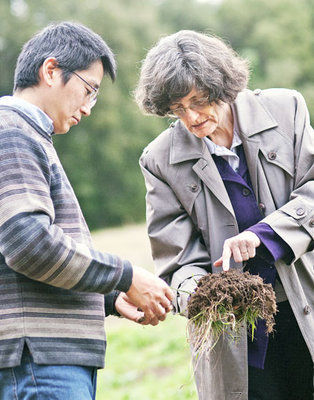
A noted expert in soil biology traveled from Pennsylvania to a 22-acre natural farm in Bonny Doon last week for a meeting of minds concerning soil health and its effects on organic growing.
Elaine Ingham is the chief scientist, specializing in soil microbiology, at the Kutztown, Penn.-based Rodale Institute. She has spent her career studying soil, looking at the ways small adjustments to naturally occurring variables in the soil can create customized conditions for individual crops.
“We look for life in the soil — bacteria, fungi, protozoa, nematodes,” she said. “We help people understand what each organism group does.”
As part of the Rodale Institute, founded by organic farming pioneer J.I. Rodale, Ingham travels to organic farms around the country to promote better understanding of soil biology as a way to raise healthier and hardier plants, with an eye toward reducing the amount of resources needed.
Shumei Farms in Bonny Doon is part of a worldwide Japanese organization that espouses a spiritualistic approach to growing food with natural and nonchemical techniques, known as “natural agriculture.” Shumei has had a relationship with Rodale Institute since Shumei founder Mokichi Okada met Rodale in the 1940s, said Rosann Spetti, Shumei’s outreach marketing coordinator.
Since then, Shumei’s philosophy of farming in harmony with nature has been one of the types of organic farming studied at the Rodale Institute.
“It’s beyond organic farming,” Spetti said. “You cannot grow anything without being spiritually connected to the land.
“(Ingham) educates people about soil life and what makes for a healthy soil. We’re talking together about how nature can grow things beautifully.”
Ingham explained that the Shumei philosophy was similar in many respects to the scientific approach she uses.
“What (Shumei) are talking about and what I research are very complementary,” said Ingham, who added that she had not been familiar with the Shumei concept before beginning her work at the Rodale Institute.
“If you can get the biology correct, there’s no need for inorganic pesticides,” she said. “Mother Nature has already figured out how to align the soil for what a plant needs.”
Ingham said that as climates change, creating proper soil structure and a balance of soil organisms is increasingly important, as crop plants that can develop deeper root systems are more resistant to drought.
“We build structure in the soil, the better the soil and the deeper the roots,” she said. “We build structure in the soil, we can reduce the amount of water used by 50 to 70 percent.”












